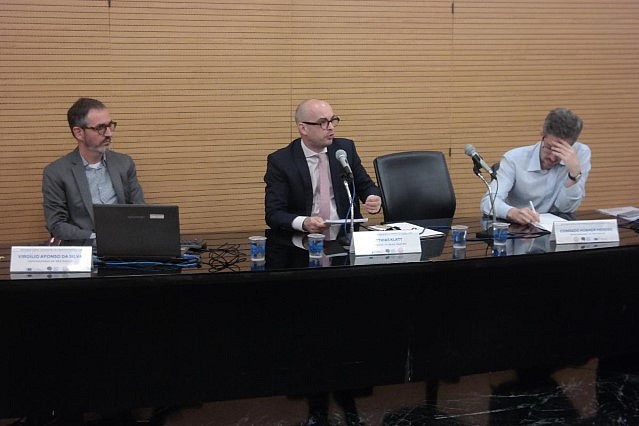Teaching Programme USP April 2023:
Lecture “The Use of Foreign Precedent”
Courts worldwide employ reference to previous case law as a standard type of argument, which holds for both civil and common law systems. Once the case relied upon stems from abroad, however, things get messy. Critics say that using foreign precedent was undemocratic and illegitimate. I will review the now classical debate between Justices Breyer and Scalia in the US Supreme Court to extract the main arguments for both sides. First, I will demonstrate that using foreign precedent puts us in a dilemma. Second, I will juxtapose this dilemma with a different dilemma we are familiar with in legal argumentation more generally. Third, I will discuss how we can arrive at a justified use of foreign precedents. All in all, I will demonstrate where and why Scalia is mistaken and defend the use of foreign precedent as an impeccable type of legal argument.
Lecture “Hobbes in the City. A Reply to Tsakyrakis’ Second Balancing Critique”
In his lucid chapter ‘Disproportionate Individualism’, Stavros Tsakyrakis argues that proportionality-based balancing causes European legal systems to adopt a Hobbesian political philosophy, characterised by an overly individualistic model of ‘total freedom’. In this way, Tsakyrakis says, we have a skewed perception of society and social justice. He underlines his criticism with an attack against a general prima facie right to everything and suggests an alternative model that narrowly defines the scope of rights. In my reply, I will demonstrate why Tsakyrakis’ alternative suggestion is as problematic as the model he criticises. I will argue that there is no harm in accepting a general right to liberty. My main point will be to suggest how Tsakyrakis’ criticism and the standard balancing account can be reconciled. I will conclude by outlining what I take to be the lasting value of Tsakyrakis’ ideas on balancing.
Workshop “Writing as an Academic Scholar. Challenges and Best Practices”
Writing as an Academic Scholar faces numerous challenges. These challenges stem partly from our own internal mindsets and habits. In other parts, they are posed to us from the external world: Universities all over the globe have been turned into enterprises, burdening scholars with ever more administrative tasks, science to public activities, and the frantic race for third-party funding. This significant paradigm shift threatens to destroy any possibility of engaging in proper research and writing. My lecture will depart from the understanding that scholars need to respond to both challenges by radically changing how they understand their role in academic institutions. This allows us to see more clearly which work habits are healthy and lead to prolific writing and which are not. In this workshop, I will share some of the insights developed recently in writing classes (tellingly outside Universities) and some personal tips and tricks that helped me tremendously regain my power as an academic writer. The Workshop-format will allow for more discussion and exchange of ideas among participants.
Workshop “Constitutional Theory” (Doctoral Students)
The discipline of constitutional theory has sparked new interest in the last 20 years, as can be witnessed from many papers in journals like the International Journal of Constitutional Law (Icon) and its accompanying conferences. This development inspired the creation of a new book series, the Hart Studies in Constitutional Theory (Oxford), which I co-edit together with Charles Barzun (Virginia) and Maartje de Visser (Singapore) and on whose advisory board Professor Afonso da Silva sits. In this workshop, we will discuss the concept and breadth of constitutional theory and briefly introduce the first six volumes of the series.
